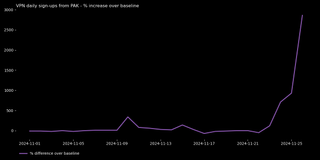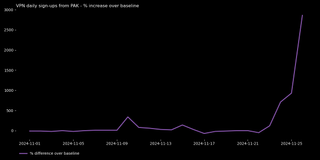People in Pakistan may still be able to use VPN services without restrictions as the country’s telecom body has decided not to ban VPN usage after all. This came as Pakistan’s Law Ministry said the government cannot legally block VPNs.
The Pakistan Telecommunication Authority (PTA) originally set the deadline for November 30 to begin implementing a new policy regulating VPN usage. According to the new rules, businesses and freelancers could only use a registered service for legitimate purposes such as banking, foreign missions, corporate enterprises, universities, IT companies, and call centers.
On Saturday, November 30, however, the PTA’s chief Chairman Major General (retired) Hafeezul Rehman announced the government’s decision to extend the registration deadline. A day later, the PTA withdrew the VPN ban completely “over lack of legal grounds” – the Pakistani English-language newspaper Dawn reported.
What’s behind the Pakistan VPN debate?
Pakistanis have been increasingly turning to the best VPN apps throughout 2024 as a means to bypass ever-growing government-imposed restrictions.
WhatsApp is the latest social media platform blocked in the country this year. The block was implemented only two days after authorities restricted Bluesky amid a surge in popularity worldwide. X ( formerly Twitter) has been inaccessible without a VPN since February. Meta’s Facebook and Instagram were also restricted in July 2024 and May 2023, respectively, according to Surfshark’s Internet Tracker.
While such circumventing software becomes a crucial resource for both residents and visitors, authorities reportedly targeted VPN usage during the year, too. Residents have faced temporary connectivity issues since February (exactly when X was first restricted).
In August, the government first shared the plans to regulate the use of VPNs as a way to curb VPN misuse. Authorities would later deem unregistered VPNs a “security risk” for Pakistan as they can be used to access “sensitive data.”

The PTA has been urging businesses and freelance workers to register their VPN service with the telecom body to avoid any disruptions. Yet, the lack of guidelines for non-commercial VPN users opened up the debate on whether or not the government could actually legally ban VPNs in the country.
Now, it looks like they found the answer – a Pakistan VPN ban goes against the law, according to the country’s Law Ministry.
“There was an interpretation issue with the clauses in the Prevention of Electronic Crimes Act (PECA) 2016, and eventually, it has been noted that the reading of the Interior Ministry in this regard was weak, and the courts would allow the functioning of the VPNs,” a source within the Interior Ministry told the Dawn.
Do you know?

A virtual private network (VPN) is security software that encrypts your internet connections to prevent snooping. It also spoofs your real IP address location to boost anonymity and grant access to otherwise geo-restricted content.
As per section 34 of PECA, the government can block content but not tools (like VPNs, in this instance).
The news is likely to come as a relief for the thousands of Pakistanis relying on VPN services to keep accessing the free web and protect their privacy online. Yet, issues for VPN users across the country may not end here.
Prominent individuals close to the government have often criticized VPN usage. On November 15, for example, Pakistan’s religious chief argued that using a VPN is against Islamic law and called for a ban. The Ministry of Interior also called to block all “illegal” VPNs on the same day, claiming that terrorists use these tools “to facilitate violent activities and financial transactions in Pakistan.”
In a briefing to a Senate committee, the PTA Chairman also reiterated that “individuals should not access unauthorized social media apps or websites through VPNs,” the Dawn reported.
Besides a growing anti-VPN sentiment, Pakistan has reportedly implemented a China-like internet firewall that “has the ability to block VPNs” – a Ministry of Defence official, familiar with the new deployments, told Al Jazeera.
Whether or not VPN censorship will increase it’s still difficult to say for certain, but we can expect the Pakistan VPN debate to keep evolving over the next weeks.
Services Marketplace – Listings, Bookings & Reviews
